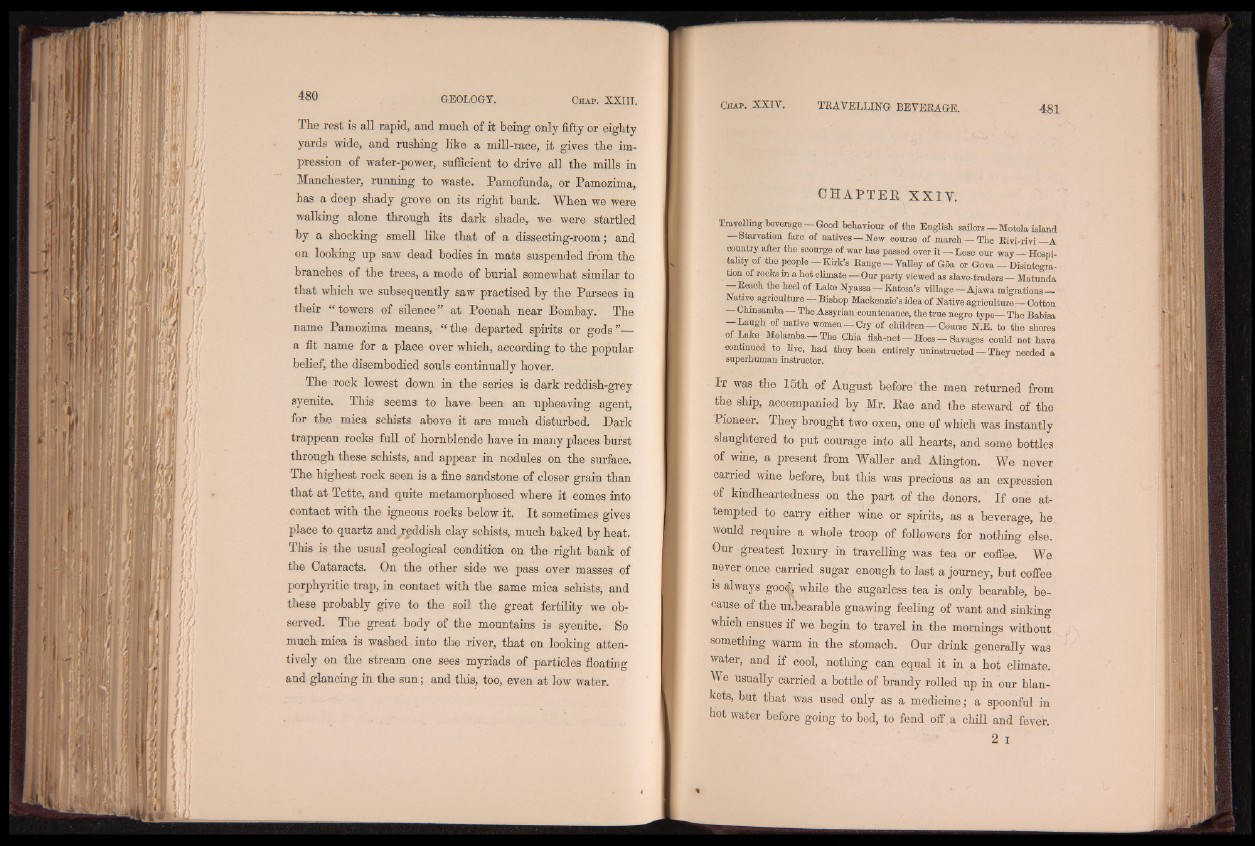
The rest is all rapid, and much of it being only fifty or eighty
yards wide, and rushing like a mill-race, it gives the impression
of water-power, sufficient to drive all the mills in
Manchester, running to waste. Pamofunda, or Pamozima,
has a deep shady grove on its right bank. When we were
walking alone through its dark shade, we were startled
by a shocking smell like that of a dissecting-room; and
on looking up saw dead bodies in mats suspended from the
branches of the trees, a mode of burial somewhat similar to
that which we subsequently saw practised by the Parsees in
their “ towers of silence” at Poonah near Bombay. The
name Pamozima means, “ the departed spirits or gods ”—
a fit name for a place over which, according to the popular
belief, the disembodied souls continually hover.
The rock lowest down in the series is dark reddish-grey
syenite. This seems: to have been an upheaving agent,
for the mica schists above it are much disturbed. Dark
trappean rocks full of hornblende have in many places burst
through these schists, and appear in nodules on the surface.
The highest rock seen is a fine sandstone of closer grain than
that at Tette, and quite metamorphosed where it comes into
contact with the igneous rocks below it. I t sometimes gives
place to quartz and^reddish clay schists, much baked by heat.
This is the usual geological condition on the right bank of
the Cataracts. On the other side we pass over masses of
porphyritic trap, in contact with the same mica schists, and
these probably give to the soil the great fertility we observed.
The great body of the mountains is syenite. So
much mica is washed into the river, that on looking attentively
on the stream one sees myriads of particles floating
and glancing in the sun; and this, too, even at low water.
C H A P T E R XXIY.
Travelling leverage —Good behaviour of the English sailors — Motola island
Starvation fare of natives—New course of march — The Eivi-rivi A
country after the scourge of war has passed over it — Lose our way Hospitality
of the people - Kirk’s Range - Valley of Goa or Gova ^jDisintegra-
tion of rocks in a hot climate — Our party viewed as slave-traders — Matunda
Beach the heel of Lake Nyassa—Katosa’s village—Ajawa migrations '
Native agriculture—Bishop Mackenzie’s idea of Native agriculture—Cotton
— Chinsamba— The Assyrian countenance, the true negro type— The Babisa
— Laugh of native women —Cry of children—Course N.E. to the shores
of Lake Molamba— The Chia fish-net—Hoes —Savages could not have
continued to live, had they been entirely uninstructed — They needed a
superhuman instructor.
It was the 15th of August before the men returned from
the ship, accompanied by Mr. Rae and the steward of the
Pioneer. They brought two oxen, one of which was instantly
slaughtered to put courage into all hearts, and some bottles
of wine, a present from Waller and Alington. We never
carried wine before, but this was precious as an expression
of kindheartedness on the part of the donors. If one attempted
to carry either wine or spirits, as a beverage, he
would require a whole troop of followers for nothing else.
Our greatest luxury in travelling was tea or coffee. We
never once carried sugar enough to last a journey, but coflfee
is always goo<& while the sugarless tea is only bearable, because
of the unbearable gnawing feeling of want and sinking
which ensues if we begin to travel in the mornings without
something warm in the stomach. Our drink generally was
water, and if cool, nothing can equal it in a hot climate.
We usually carried a bottle of brandy rolled up in our blankets,
but that was used only as a medicine; a spoonful in
Hot water before going to bed, to fend off .a chill and fever.
2 i